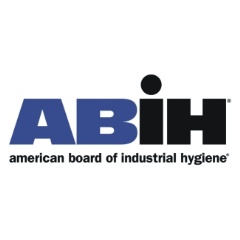FEMA seeks input from CIHs on Chemical Operations Support Specialist (COSS) Curriculum Development
The American Board of Industrial Hygiene® (ABIH®) administers the internationally recognized Certified Industrial Hygienist® (CIH®) and Qualified Environmental Professional (QEP®) programs.
The Federal Emergency Management Agency (FEMA) Chemical, Biological, Radiological/Nuclear (CBRN) Office, and the Center for Domestic Preparedness (CDP) COSS Working Group are conducting a survey and would like input from Certified Industrial Hygienists.
The Federal Emergency Management Agency (FEMA) Chemical, Biological, Radiological/Nuclear (CBRN) Office, and the Center for Domestic Preparedness (CDP) COSS Working Group are conducting a survey and would like input from Certified Industrial Hygienists. The COSS Working Group will use the data from the Chemical Preparedness and Response Survey to inform the position roles and develop a training curriculum for the COSS Program.
To contribute to the Chemical Preparedness and Response Survey, please provide your feedback to https://www.surveymonkey.com/r/SWVSWNP.
Following any significant chemical emergency, the communication and interpretation of key incident data to decision makers are crucial to ensuring rapid activation and effective utilization of emergency response resources. In response to chemical emergencies such as Deepwater Horizon or Novichok incidents, the demand for subject matter expertise to answer specific questions about chemical exposure, the environment, modeling of the hazard, data and risk management, public protective actions, and other scientific and technical issues can exceed the resources available from the state and county response entities. The Chemical Operations Support Specialist (COSS) is that supplemental resource. The COSS is a subject matter expert and force multiplier who can bridge technical and operational aspects of a response for the state, local, territorial, and/or tribal (SLTT) entities. The COSS expedites the transition from response to recovery.
The concept for the COSS was developed from the findings of a Chemical Preparedness and Response capability needs assessment administered by the Center for Domestic Preparedness. CDP surveyed over 400 SLTT emergency response personnel from disciplines such as police, fire, emergency medical services, hazmat, and academia. The findings of the capability-needs assessment were categorized into high, medium, and low performance, which correlate with survey respondents’ respective levels of confidence in their abilities. Low-performance metrics are included below.
- Active Involvement 44% - Integrate into ICS/EOC Structures as Chemical Specialists.
- Knowledge of Structures 40% - Know Chemical Response Assets at the Federal and SLTT Level; Provide Training for Chemical Incidents.
- Interpretation of Data 37% - Interpret Chemical Data; Synthesize Knowledge of Toxicological Principles to Conduct Environmental Risk Assessment.
The data explains that SLTT responders are confident in their respective abilities to handle routine chemical-specific responses. However, these same jurisdictions are less confident in their respective ability to handle complex or catastrophic chemical incidents that have the potential to overwhelm their jurisdictional resources.
The collaboration of expertise from all levels of a catastrophic incident ensures the COSS is a deployable, National Incident Management System resource designed by and for the end user. The COSS overall functions include:
- Local preparedness
- Qualified chemical and ICS expert
- Joint-command solutions
- Cross-jurisdictional support
- Actionable intelligence
- Equipment assistance
- Incident assessment
- Recommendations
- Information sharing
- Exercise and training participation
As the program moves forward, FEMA hopes to utilize the expertise of ABIH® diplomates. With the help of CIHs, the COSS Program can be a resource that strengthens the capabilities of our SLTT communities, making them more resilient, and our nation more prepared.
To learn more about the American Board of Industrial Hygiene®, the Certified Industrial Hygienist® credential, or to locate a CIH® to perform industrial hygiene services, please visit www.ABIH.org or email abih@ABIH.org . For information about the Qualified Environmental Professional (QEP®) credential or Environmental Professional In-Training (EPI) designation, visit www.IPEP.org or email ipep@IPEP.org . Please call (517) 321-2638 for questions about ABIH® or its credentials and designations.
About the American Board of Industrial Hygiene ®
Since 1960, ABIH®, a not-for-profit corporation, has been the world’s largest organization for certifying professionals in the practice of industrial hygiene. ABIH® is the premier credentialing body responsible for ensuring high-quality certification including education, experience, examination, certification maintenance, and ethics enforcement. ABIH® also administers the Qualified Environmental Professional (QEP®) credential for established environmental practitioners and the Environmental Professional In-Training (EPI) designation for early-career practitioners. Currently, more than 7,600 people around the world hold the CIH® credential, QEP® credential, or EPI designation.
( Press Release Image: https://photos.webwire.com/prmedia/12710/239862/239862-1.jpg )
WebWireID239862
- Contact Information
- Paul Cochrane
- President
- Cochrane & Associates, LLC
- Contact via E-mail
This news content may be integrated into any legitimate news gathering and publishing effort. Linking is permitted.
News Release Distribution and Press Release Distribution Services Provided by WebWire.
